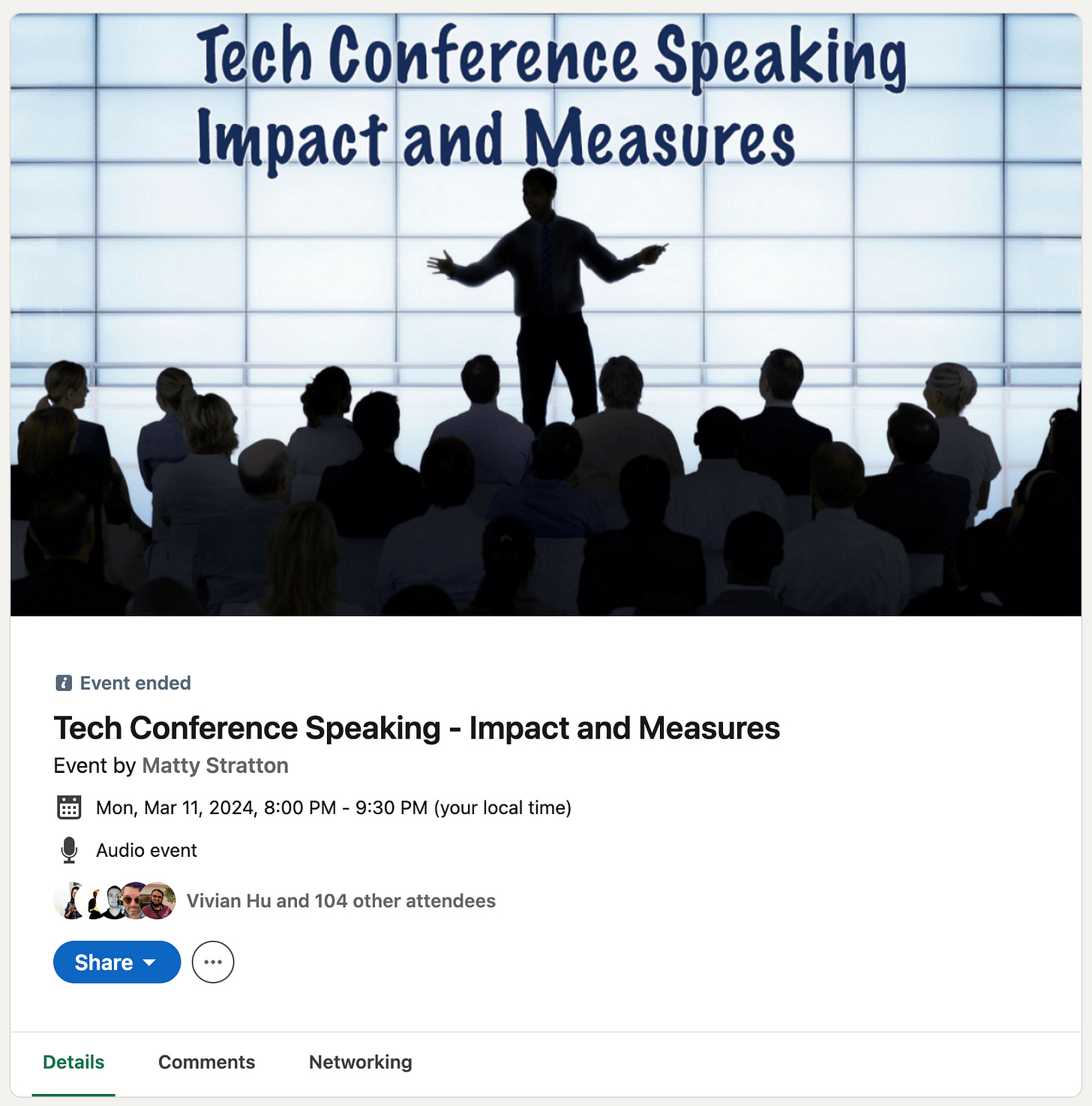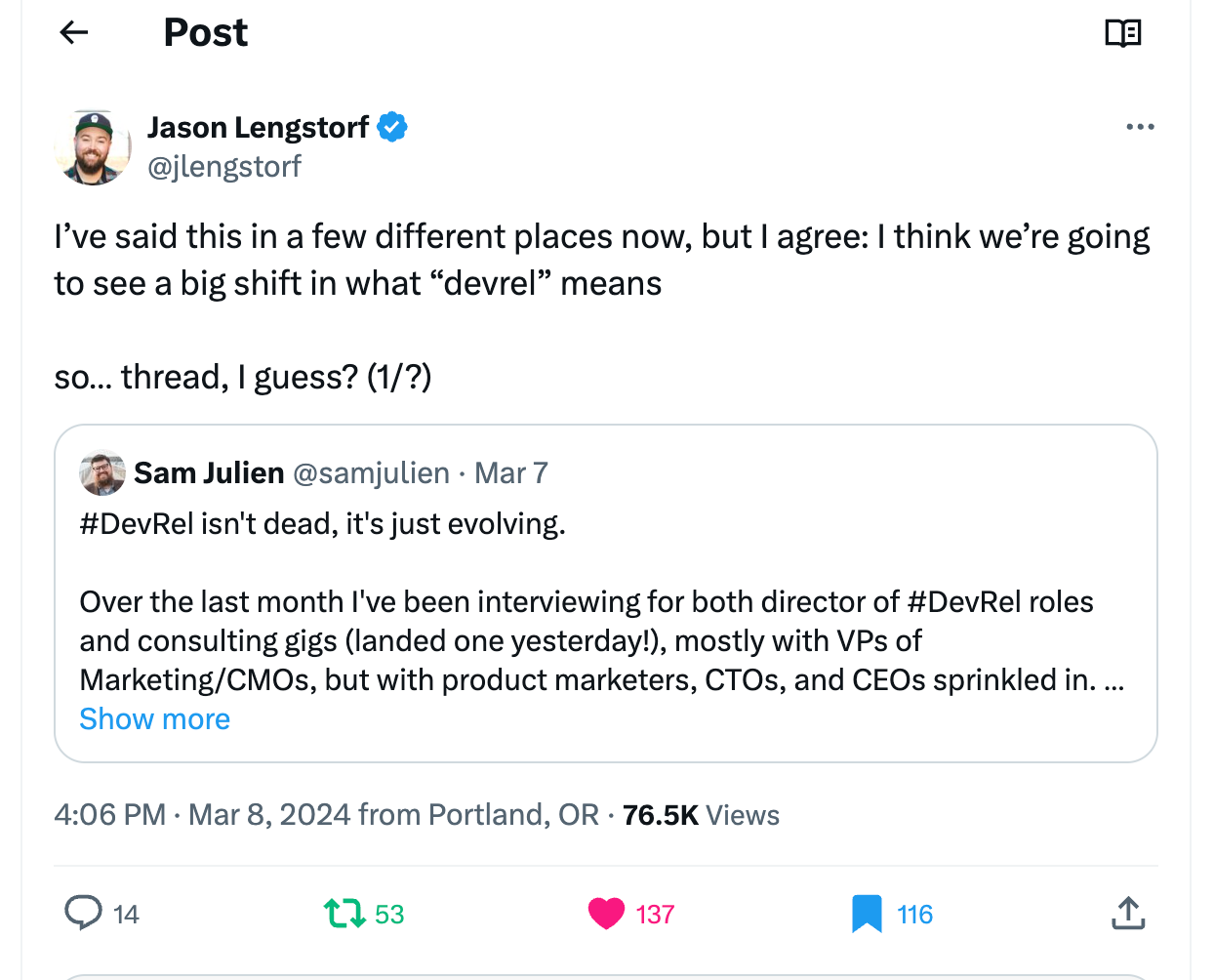Measuring the Impact of DevRel at Conferences
Key takeaways from a fascinating LinkedIn event with Matty Stratton and co!
At the start of this week, I chatted with several interesting DevRel and GTM experts in Matty Stratton’s LinkedIn Live Radio event, “Tech Conference Speaking - Impact and Measures.”
I’ll say a big thanks to Matty for organizing this event, which emerged from an interesting LinkedIn thread related to this topic. It was great sharing the virtual stage with Derek Weeks, Cecelia Martinez, Stuart Clark, and several others.
The full recording and transcript of the event are on Matty’s Descript page. Derek has also shared his key takeaways on LinkedIn.
This post captures my thoughts on this topic.
Key takeaways from the LinkedIn discussion
There were several key themes from the Matty’s LinkedIn Radio event:
Understand how company goals relate to your event goals
As I have mentioned here a few times before, it is vitally important for DevRel leaders to be aligned with the overall company goals and have agreed on key performance indicators (KPIs) and/or objectives and key results (OKRs).
It may sound trite, but I’ve mentored several DevRel folks who didn’t have KPIs over the past year. Most of them were very nervous about justifying their impact on the business as the end of the ZIRP era approached and organizations were looking to make cuts.
Once you understand the company goals, you can map these to your event goals.
For example, if the company wants to boost its awareness and marketing-qualified lead (MQLs) pipeline, setting an event MQL target is a winner. You’ll probably need a booth and some upfront planning to accomplish this.
If the business is unsure of product-market fit or wants to better understand what assets or content would be useful to close deals, set a goal for a specific number of conversations. Before the event, you’ll want to chat with the product and sales teams to understand the biggest unknowns or challenges (and capture your learnings in a shared document!).
If you’re flying solo at the event and only presenting one talk, you may want to keep it simple and target the number of attendees, conversations, and social media mentions for your talk (but be prepared to justify why you’re attending!).
Although unconnected to our conversation at the time, I later saw a fantastic X/Twitter thread from Jason Lengstorf (who quotes another good thread from Sam Julien) explore this topic in more detail.
Agree on key metrics and track these throughout the event
Once you are aligned on your company and event goals, you’ll need some way of tracking metrics, either at the event (e.g. badge scans, spreadsheet with talk attendee details, etc.) or after (e.g. leads generated, analysis of mentions on social media, etc.).
Some discipline is needed here. For first-timers staffing a booth, it can be intimidating to ask to scan an attendee’s badge, or you might get tired of recording all of your conversations. Persevering will pay off when you return to the office and prepare to share your quantitative and qualitative data.
Share your learning from the event with a wider audience
When you’ve completed presenting at an event or running a sponsored booth, be sure to summarize and share your learning with the rest of the company. Ideally, you could present something at a company all-hands meeting. At the very least, create a simple slide deck or document with the KPIs and key learnings, and share this on your Slack/Teams/Discord.
Visibility ensures alignment and hopefully generates internal follow-up and additional questions from other teams.
Ensure you “close the loop” on impact and attribution
Finally, it’s worth mentioning that it’s nearly impossible to track everything that happens at a conference. Some people may never approach you at the event, but they will share your talk within their company, which in turn drives someone new to join your open-source community or create a sales opportunity, etc.
I always encourage cross-team collaboration in “closing the loop.” For example, ask your sales folks if new leads have seen any of your conference talks or chatted with anyone at the booth. Ask your community managers to welcome new joiners to your Slack or Discord channels and ask what drove them to sign up. Ask your engineers about the motivations or source of new code or documentation contributions on your open-source projects.
Have you struggled with measuring DevRel's impact?
I hope this has provided some food for thought on the tricky subject of measuring the impact of developer relations. If you have any feedback or comments or want to share good and bad examples of attempts to measure DevRel activities, please do so in the comments or via DMs.





I missed the live event on LinkedIn and so this article has been very valuable, thanks a ton!